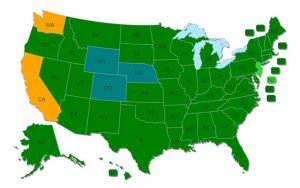In 1967 Congress passed the Wholesome Meat Act, Public Law 90-201, amending the Federal Meat Inspection Act (FMIA). The act expanded the federal government’s authority over meat slaughter and processing to intrastate commerce but did create exemptions from the requirement that an inspector be present when slaughtering is taking place. The Wholesome Meat Act allowed the “uninspected” slaughter of meat animals at a custom facility as long as the owner of the animal did not resell the meat and distributed only to members of the owner’s family, employees, or non-paying guests. The owners of the animal must be established at the time slaughtering takes place.
The USDA exemptions from routine federal inspection are codified in 9 CFR 303.1. The exemptions most applicable to our members include:
- Livestock slaughtered for personal use: Slaughter and processing is performed by the owner of the livestock and used only for the private use of the owner who raised the livestock, members of the owner’s household, and the owner’s nonpaying guests and employees.
- Livestock custom slaughtered or prepared: A custom exempt operator slaughters livestock belonging to someone else and the resulting product may only be used in the household of that owner, by the owner, and members of the owner’s household, non-paying-guests, and employees.
- The products cannot be sold to a non-owner or donated.
- Food Safety and Inspection Services (FSIS) registration is not required though state/local permitting requirements may apply.
- There may be more than one owner of the live animal though state/local rules may be more restrictive.
- Products must be labelled “Not for Sale” and kept separate from for sale products.
Note: The business operator determines whether s/he qualifies for an exemption, though s/he is subject to inspection and verification by federal investigators. Also, facilities operating under an exemption remain subject to the adulteration, misbranding and sanitation provisions of the FMIA as well as the access and examination rules that require the maintenance of certain business records and that access be made available to FSIS personnel on facilities, inventory, and records.
In addition, per guidance from the FSIS issued in 2018, under the personal use exemption, a person may purchase livestock from a farm or ranch and then slaughter it onsite using the farm or ranch facilities or equipment. The criteria are:
- If a person purchases livestock and uses the on-site facilities without assistance from the seller, then the activity remains personal use.
- If the seller participates in the slaughter or processing activity, then the facility owner is subject to the custom [slaughter] exempt criteria.
States can adopt their own standards for custom slaughter facility and personal use exemption but they must be at least as strict as the federal guidelines. The state-by-state chart has greater detail on the laws regarding custom slaughter facility and personal use exemption in each state.
Read the full State-by-State Review of Custom Slaughter Facility & Personal Use Exemption Laws
YOUR FUND AT WORK
Services provided by FTCLDF go beyond legal representation for members in court cases.
Educational and policy work also provide an avenue for FTCLDF to build grassroots activism to create the most favorable regulatory climate possible. In addition to advising on bill language, FTCLDF supports favorable legislation via action alerts and social media outreach.
You can protect access to real foods from small farms by becoming a member or donating today.
